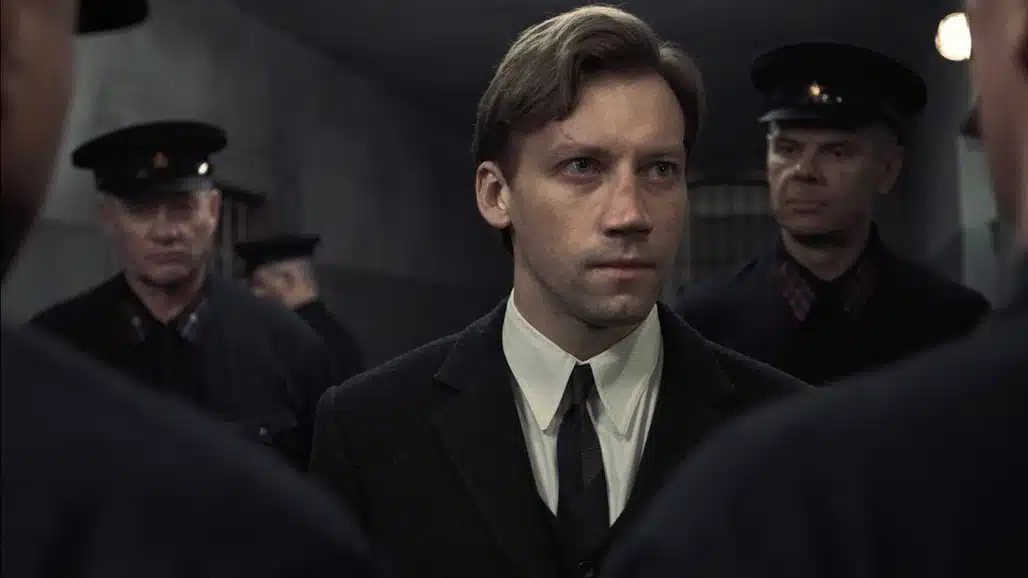




Dir: Sergei Loznitsa | Drama ,2025 118′
Reviewed by Peter Herbert
Sergei Loznitsa’s Two Prosecutors ends as it begins, with the feel of a surreal M C Escher drawing of doors and stairways that appear to lead everywhere, without actually getting anywhere.
Divided into chapters, the film opens with images of women waiting outside a prison gate. Like a silent Greek chorus they say nothing but can see what is happening to husbands, sons and fathers behind prison walls enduring a debilitating lack of basic human rights.
The setting is 1937 during the authoritarian rule of Stalin and his reign of terror when former and loyalist members of the communist party were subject to brutal treatment as political prisoners. The first chapter focuses on an ill elderly prisoner (played by Aleksander Filppenko) who is forced to burn letters written by inmates sent to governors about prison conditions.
One note, written in blood, is tucked into his pocket and will be smuggled out to be seen by an idealistic young prosecutor who takes up the case of the dying prisoner. The prosecutor (played by the striking broken-nosed Alexander Kuznetsky) is a young man ill-prepared for the uncaring nature of totalitarian authoritarianism which has the power to corrupt and suppress anyone who steps out of line.
In the second chapter, the prosecutor is given a railway ticket and during several train journeys encounters a range of eccentric characters who question his sexuality and youthful idealism. The final chapter is a form of black comedy, with no laughter, as the gates that once opened for the prosecutor may well be closing as if in the cyclical drawings of Escher.
The film is rich in detail with sensitively observed sequences. These include the way the prosecutor neatly folds his coat, arranges his hat, and buttons up a case to reveal a man in control of himself – if not of others. A scene on a busy stairway where the prosecutor helps a woman gather papers spilled out of a folder happens alongside a flurry of indifference and lack of gratitude.
Faces of prison warders betray a sense of collusion with authorities as if moral justice has been supressed or erased in order to survive. The elderly prisoner describing his life as an idealistic young communist feels like a foreboding mirror image of the young prosecutor and confirms Loznitsa’s sensitive skill with actors.
The film may not always be an easy watch with often heavy dialogue-laden exchanges revealing a rich sense of literary references. These writings include Nikolai Gogol’s Dead Soul, and Franz Kafka’s The Trial although the key source are stories written by the physicist Georgy Demidov who spent 14 years incarcerated in notorious Siberian gulag labour camps. Written in 1969, they were published in 2009 after the writer’s death in 1987.
Visually the framing of the 1:1.33 format used by cameraman Oleg Mutu recalls compositions from Robert Bresson’s prison film A Man Escaped with colour film stock stripped of primary colours, providing instead a pallet of beautiful light and evocative visual detail. There is sparse use of Christiaan Verbeek’s music, highlighting the film’s beautiful sense of naturalistic sound while the linear narrative provides Loznitsa with a sense of control and structure making Two Prosecutors his most accessible film so far. The film feels like it could be the third panel of a trilogy of life and death with intriguing links to two previous Loznitsa films screened at the LFF.
With Babi Yar. Context in 2021, the filmmaker assembled an archival reconstruction from newsreel footage of the Nazi massacre in Russia of over 33,771 Jews during three days in September 1941. The archive footage concluded with contemporary documentary shots of present-day landscapes harbouring memories of a terrible genocide.
With The Invasion in 2024, Loznitza developed the same film’s documentary coda into another visual tableau filmed over four seasons for a chronicle of everyday Ukrainian life. Although sounds of warfare and destruction are heard and felt, very little is seen of Ukraine’s Russian invaders.
Two Prosecutors returns Loznitsa to earlier fiction films that include A Gentle Creature 2017 and Donbass 2018. Intervening years have enriched and emboldened both the filmmaker’s mix of film genre and cynical view of the ugly power of authoritarianism. As if on a mission, he shows no sign of resting and Two Prosecutors serves up a powerful case to set before the prosecutor. @PBH V3
TWO PROSECUTORS had its world premiere at this year’s CANNES FILM FESTIVAL and will screen during BFI LONDON FILM FESTIVAL 2025 before a general release courtesy of CURZON Film in November 2025